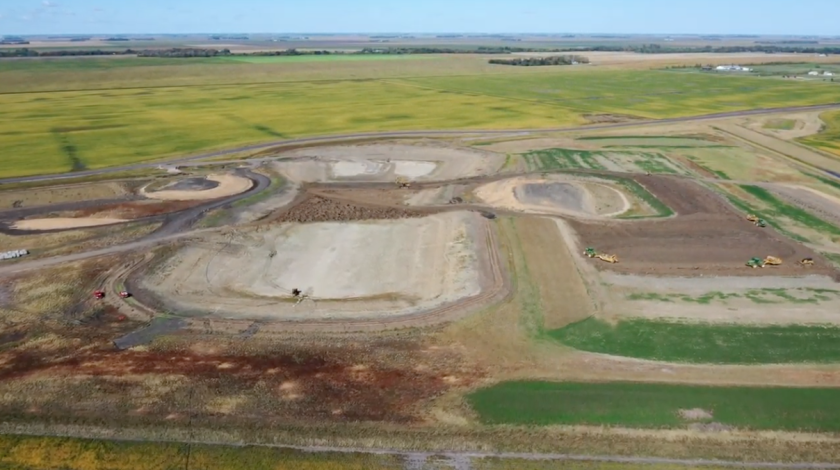FARGO — North Dakota legislators are pushing for an audit to examine land purchased for the Fargo-Moorhead flood diversion project to settle long-standing concerns about the process and amounts paid for some parcels.
The Legislature’s Water Topics Overview Committee voted to request the audit, a step that would require approval by the Legislative Audit and Fiscal Review Committee and would involve the Office of the State Auditor.
The idea of an audit was proposed by Rep. Bob Martinson, R-Bismarck, when the water overview panel met Tuesday, Dec. 10.
Martinson said his motion was prompted by a letter to the editor that appeared in newspapers, including The Forum, by diversion critics who contend that local governments have paid exorbitant sums on behalf of the diversion project for homes around Oxbow, N.D., as well as the Oxbow Country Club.
That letter , by Trana Rogne and others representing the Richland-Wilkin Joint Powers Authority, urged State Auditor Josh Gallion to audit property purchases for the diversion by the Cass County Joint Water Resource District totaling $248 million over nine years.
ADVERTISEMENT
“There have been questions about what they’ve paid property owners, particularly the Oxbow Country Club, for quite some time,” Martinson said in an interview Thursday. “I believe they’re quite serious. I thought, well, let’s get to the bottom of this.”
Rep. Jim Schmidt, R-Huff, the water committee’s chairman, agreed that some legislators have had questions about property acquisitions for the $2.75 billion diversion project for years, and committee members agreed with Martinson that an audit would help resolve those questions.
“There’s a concern about the acquisition process and funding thereof,” Schmidt said, adding that state tax dollars are involved in the buyouts. “The concern is they’re spending too much on these properties.”
Although spending concerns have surfaced periodically over the years, “I think it kind of reached a pinnacle,” he said.
RELATED:
-
Preparations for $2.75 billion Fargo-Moorhead diversion project ramp up even as winter slows construction
-
Biologists explain 2020 plans for river health studies for diversion
-
Ames Construction awarded more than $59 million for Diversion construction
“I believe they’ve done it correctly, I truly do,” Schmidt added, referring to property purchases for the diversion. “With that thought in mind,” he said, an audit would help to clear the air. “It’s a neutral eye coming in and assessing the situation.”
Mary Scherling, a Cass County commissioner and chairwoman of the Metro Diversion Authority board, said all diversion expenditures are scrutinized by local governments and ultimately are approved by the authority board’s finance committee.
“We have our policies and procedures in place,” she said. “Everything goes through the finance committee. Lots of people have their eyes on the bills as they go up the chain. There’s no lack of people looking at them.”
ADVERTISEMENT
Joel Paulsen, the Diversion Authority’s executive director, briefed legislators in the Tuesday meeting, including an update on land acquisitions for the project. So far, he said, voluntary agreements have been reached on more than 340 properties, including about half of the land needed for the diversion channel, intended to divert Red River floodwater around Fargo-Moorhead.
“The idea of an audit is something our Finance Committee was already considering and was contemplating the use of an independent local accounting firm,” Paulsen said in a statement. “We have strong transparent financial processes in place, with multiple reviews and financial controls in place.”
Also, he said, reimbursements from the state are reviewed by the Office of the State Engineer. The finance committee will resume the discussion of hiring an auditing firm at its regular Jan. 22 meeting, Paulsen said.
The letter by Rogne and others, published Dec. 5 on Inforum, said about $132 million had been paid to purchase 100 homes in the city of Oxbow, including $32 million paid to Oxbow Golf and Country Club.
Payments, Rogne’s letter asserted, were multiples of the properties’ assessed value. An analysis by The Forum in 2015 found that 17 homeowners in and around Oxbow had been paid an average of 122% of their homes’ assessed value.
Property purchases for the diversion must follow state and federal standards, Scherling said.
“I’m not sure about a cap, but there certainly is a bottom,” that is acceptable for purchases according to the standards, she said. The city of Fargo has a policy of paying 110% of assessed value for flood buyouts.
Local governments want to negotiate buyouts with property owners to avoid having to go to court in an adversarial process, Scherling said.
ADVERTISEMENT
“We’re sincerely trying to do everything we can to make people whole,” she said. “Maybe not happy, but whole.”
An audit of the property purchases is welcome, Scherling said, “As long as it doesn’t slow us down any further. Time is money. That’s my only concern.”
Martinson said his motivation was not to delay the project, and said he believes local as well as state taxpayers would welcome the scrutiny. He said he has voted in favor of $750 million in state support for the project, and believes the project would benefit the state.
“I don’t see how this would delay it,” he said. “That certainly was not my intent. I think we should all be concerned about the expenditures.”









